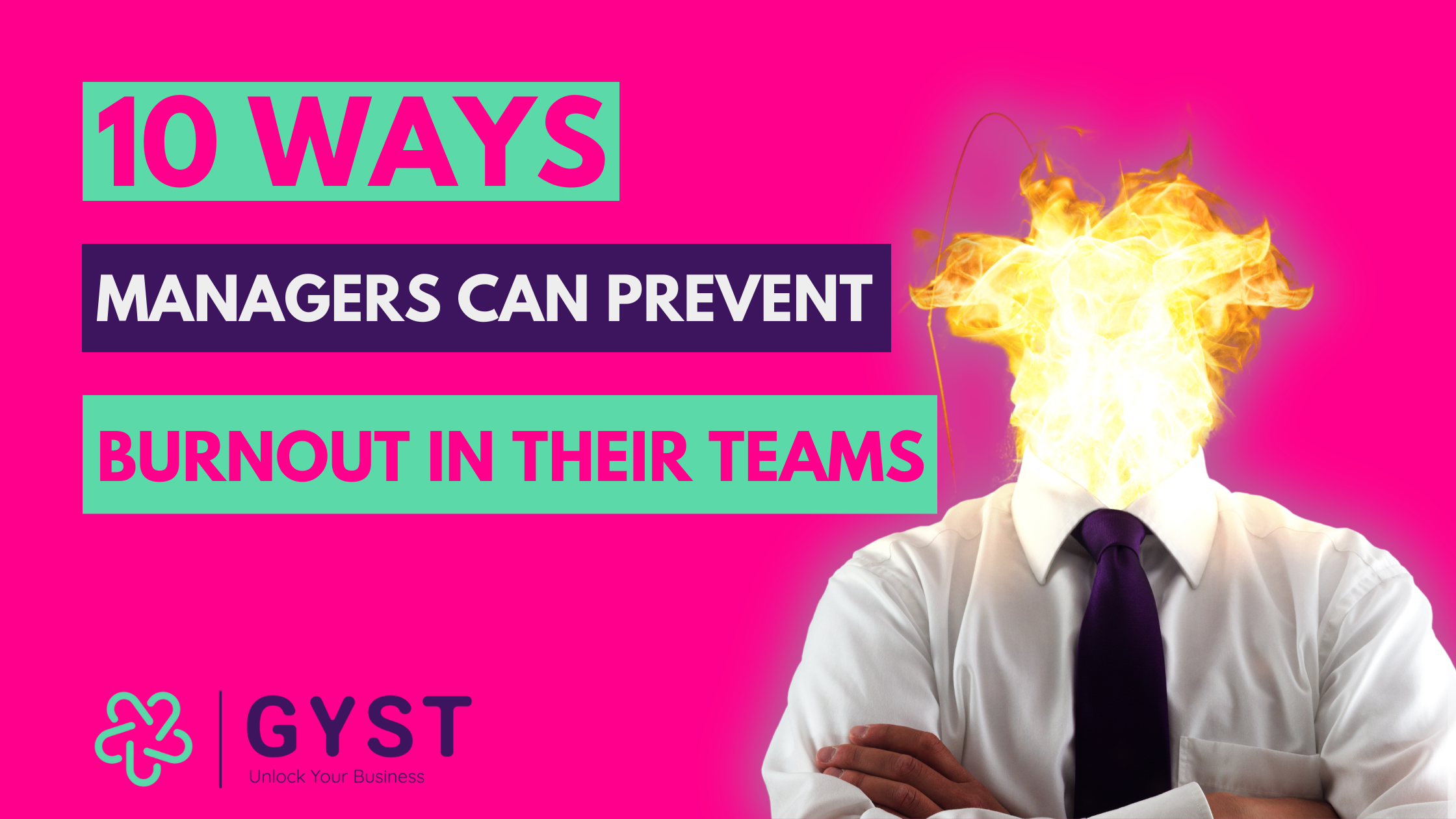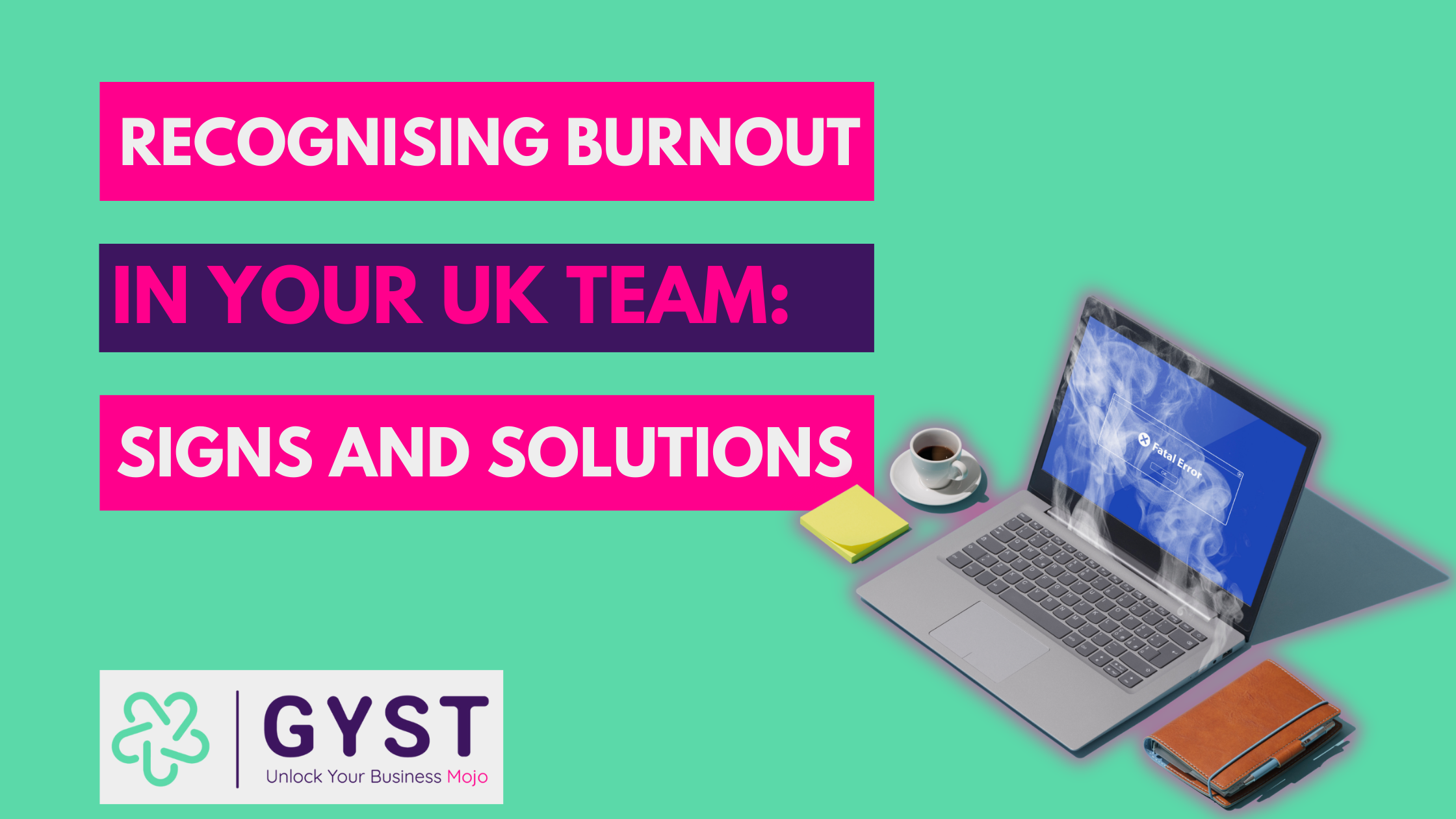If this is the first time that you are hearing about burnout, then I have to ask…where have you been?
Because it’s been a hot topic since 2019 when the World Health Organization (WHO) declared burnout as a diagnosable syndrome for occupational health. Which in all honesty, is a really positive step towards stress management and overall employee wellbeing. Before that, people were suffering from vague physical and mental health issues related to stress and not receiving very much support at all.
So, let’s delve into burnout and stress management in the workplace.
Burnout in the Workplace
The WHO defines burnout as “a syndrome conceptualised as resulting from chronic workplace stress that has not been successfully managed.” Although I agree with some of this, we’re also missing a huge piece of the jigsaw puzzle with this definition.
At GYST, we define burnout as physical, mental and emotional exhaustion resulting from prolonged stress. As we all know, stress doesn’t necessarily derive solely from the workplace. However, as managers, it is your responsibility to ensure that your team is taken care of to the best of your ability. By doing so, any burnout arising due to workplace stress is identified and effectively managed, especially as burnout can lead to feelings of cynicism and detachment from work, and reduced professional output, hindering your team and as a result, your business.
Burnout, whilst being dreadful for the individual, will also affect both the team and your organisation as a whole. When team members are burned out, they are more likely to make mistakes, miss deadlines, and have poor morale and other members of the team may need to step in, thereby putting more pressure on everybody.
As a manager, preventing your team from burning out should be high on your agenda to promote employee wellbeing.
Here are ten practical strategies as a method of guiding your employees away from burnout.
1. Set realistic goals and expectations.
One of the main causes of employee burnout is feeling overwhelmed and overworked.
As a manager, you need to make sure that your team’s workload is manageable and achievable. Work with your team members to set SMART goals (specific, measurable, achievable, relevant, and time-bound) and to break down big projects into smaller tasks.
By providing clear instructions, feedback, and support, your team is more likely to meet their goals and avoid burning out.
2. Provide adequate resources and support.
Feeling unsupported and undervalued can also lead to burnout.
So prioritise making sure that your team has the resources and support they need to do their job well. This may include training, equipment, software, or access to experts.
Additionally, it is also vital to be available to answer questions, provide feedback, and offer guidance when needed.
3. Encourage work-life balance and time off.
Work-life balance is essential for preventing burnout.
Encourage your team to take breaks, use their annual leave, and disconnect from work outside of office hours. Set an example by taking care of your own work-life balance and respecting your team members’ time off.
A good way to make sure everyone feels comfortable with this is to discuss, as a team, how you can effectively ensure no one feels responsible for checking their emails or phones during scheduled time off or outside of work hours. That way, everyone is on the same page.
Also, be sure to check that workloads are being evenly distributed, and that no one is needing to work long hours or on weekends to get through their tasks.
4. Foster a positive work culture and open communication.
A positive work culture is one where team members feel respected, supported, and valued. So it is vital that you work on creating a culture where team members feel comfortable sharing their ideas, concerns, and feedback. By encouraging collaboration, teamwork, and learning, you are encouraging a culture of trust, transparency, and accountability.
Also, if you have a sales team make sure there is healthy competition. It can be easy to create a culture of distrust amongst sales teams by pitting them against each other. Avoid doing this at all costs. Instead, encourage collaboration and teamwork to achieve targets.
5. Recognize and reward hard work and achievements.
Recognition and rewards are essential for keeping team members motivated and engaged. This may include bonuses, promotions, public recognition, or other incentives. When recognising your team’s achievements, be specific and genuine in your praise, and make sure that the rewards are aligned with the person’s goals and values. It will mean a lot more to them!
A great way to do this is to discuss how each person on your team would like to receive recognition. Some people will want public recognition and others will want it to be between yourself and them. Remember, it’s not a one-size-fits all.
6. Encourage professional development and growth.
Professional development and growth are important for preventing burnout and keeping teams engaged. Encourage your team members to pursue their interests, develop their skills, and take on new challenges as well as providing opportunities for training, mentoring, and coaching.
7. Promote self-care and stress management techniques.
Self-care and stress management techniques are important for preventing burnout and promoting employee well-being.
Encourage your team members to take care of their physical and mental health by talking to them about the importance of eating well, exercising, getting good sleep, and practising relaxation techniques.
You may even want to offer resources and support for workplace stress management, such as mindfulness meditation, yoga, or counselling.
8. Address conflicts and concerns in a timely and respectful manner.
Conflicts and concerns can quickly escalate into burnout if they are not addressed respectfully and as a matter of urgency.
It is your role to create an environment where team members feel comfortable raising concerns and conflicts. By being open and non-judgmental when discussing these issues, you will likely find that the team will come together to find solutions that are fair and reasonable.
Encourage active listening, empathy, and compromise and be sure to follow up on any agreed-upon actions to ensure that the issues have been resolved satisfactorily.
9. Lead by example and practice what you preach.
As a manager, you are a role model for your team and they look to your behaviour for their cues on what is expected of them. So, lead by example and practice what you preach.
Show your team that you as a manager value work-life balance, self-care, and professional development and abide by the values of good communication, collaboration, and conflict resolution. By modelling the behaviours and attitudes that you want to see in your team yourself, you are more likely to inspire them to behave in this way too.
10. Regularly check in with team members to assess their workload and well-being.
Regular check-ins are essential for identifying early signs of burnout and are generally just a great way to ensure your team is well and thriving.
Schedule one-on-one meetings with each of your team members to discuss their workload, progress, and concerns. Use these meetings to offer feedback, support, and recognition. And of course, keep an eye out for any signs of burnout. These could be things such as decreased productivity, absenteeism, or negativity.
If you notice any of these signs, work with that member of your team to address the root cause(s) and together find solutions that work for everyone.
Preventing burnout is an essential responsibility for managers and by investing in your teams’ well-being, you are investing in your organisation’s success too.
And don’t forget, we’re here to help so drop us a line at Get Your Sh*t Together. And if you’re looking for help on training your managers to spot the signs of burnout our Burnout Intervention Training For Leaders and Managers may be just the ticket!
If you haven’t already done so, don’t forget to sign up to our You Get The GYST newsletter where I share a shed-load of tips, tricks and techniques to keep you feeling tickety-boo!
And finally – sharing is caring. Don’t forget to share this with someone who may benefit from it.



